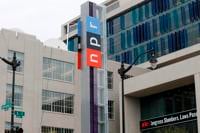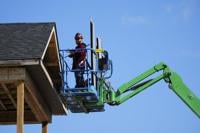BCE Inc. has requested that the federal telecommunications regulator intervene amid its dispute with Rogers Communications Inc. over wireless access on Toronto's subway network.
The parent company of Bell Canada asked the CRTC on Thursday to prohibit Rogers from adding its customers to the network until it ensures it is technically feasible to provide access to all carriers.
Urging the CRTC to ensure Rogers does not "exploit its role as gatekeeper," Bell's application said such an order would provide safeguards so "Rogers does not stand to profit from denying or delaying access."
It said Rogers has "delayed on every front" since April, when the Rogers purchased the Canadian operations of BAI Communications, which owns the TTC's wireless network. Bell alleged Rogers has not operated in good faith, "refusing to even make a high-level commercial proposal or have a preliminary technical discussion."
"Rogers cannot be allowed to entrench itself as the sole gatekeeper of wireless access in the subway," the application stated. "Already Rogers is using this position to reduce consumer choice and increase costs for its competitors."
Bell's application called on Rogers to immediately provide all available engineering assessment information to any carrier seeking access to the network. It also said the company should provide access to TTC facilities so other carriers can conduct their own planning.
It urged the CRTC to order that Rogers allow other carriers to build their own network hubs, known as carrier base station hotels, and connect to the network "as soon as technically feasible" under a consortium cost-sharing model.
Bell requested Rogers provide a response to the application by June 23 and that the CRTC rule on it by July 14.
Rogers spokesman Cam Gordon said in a statement that Bell’s application "is full of inaccuracies and mischaracterizations."
"Our commitment to modernize and expand the network to deliver full wireless coverage as soon as possible for all TTC riders, regardless of their carrier, remains unchanged," he said.
"Over a month ago, we proposed a fair and reasonable framework for all carriers to join the network and offered to use the government’s arbitration process if we couldn’t work out a deal by August. In the meantime, we’re focused on ensuring critical 911 services continue to be available for all TTC riders on the existing network and addressing a significant public safety concern.”
Rogers' proposed framework, sent to federal Industry Minister François-Philippe Champagne, pledged to consult its rivals on design and planning, accommodation of spectrum needs and access to carrier base station hotels as it adds 5G cellular capacity to the TTC.
Under the framework, Rogers would act as the lead carrier of the upgraded network, but the company would make the system accessible for other mobile carriers to provide their customers text, voice and data services.
Rogers has said extensive fibre network and radio equipment upgrades are needed to add 5G cellular capacity to the TTC, replacing the current 3G and 4G network, which is limited to TTC subway platforms and concourses and approximately one-quarter of tunnels, mostly located downtown.
The process to upgrade and expand the system is expected to take up to two years.
Rogers said its commitments are subject to the negotiation of "reasonable commercial agreements" with each carrier, which will set out details such as timing, technical specifications and the costs for other providers to access the network.
Along with the framework, Rogers proposed a dispute resolution process in case it is unable to reach deals with the other carriers "in a timely way." It proposed using Industry Canada's arbitration rules for that process, which sets out that a decision must be reached within 65 days for a written hearing or 85 days for an oral hearing.
Bell and Telus Corp. have both pointed to the consortium model used by the Montreal Metro for its wireless network as the ideal approach for the TTC, rejecting a pay-for-access model.
While Rogers has not publicly committed to a joint-build approach with other carriers, Bell's submission said Rogers "has already contractually committed to the TTC to adopt this model and there is no basis for any dispute over the core principle." It said Rogers officials have told Bell on multiple occasions it favoured a consortium approach despite not putting that in writing.
"It has now been more than three months since we first reached out to Rogers regarding access in the TTC. During that time Rogers has promised repeatedly to provide access based on the cost‑sharing model, and then refused to make any commitment to do so or to provide an alternative proposal," the application stated.
"The reason is obvious: Rogers wants to deny or delay access for all other carriers for as long possible. Unless the Commission intervenes, it is likely to be years before the majority of Canadians can access wireless services in the TTC subway system."
The CRTC confirmed it has received the application but declined to comment.
This report by Ďă¸ŰÁůşĎ˛ĘąŇĹĆ×ĘÁĎ was first published June 16, 2023.
Companies in this story: (TSX:BCE, TSX:RCI.B, TSX:T)








































